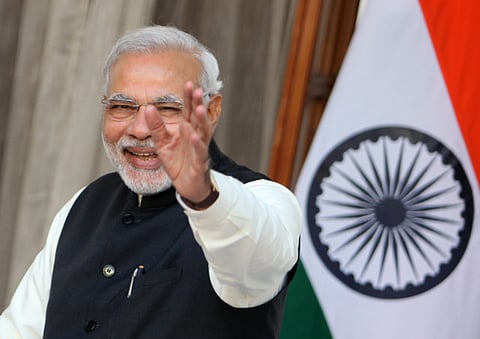Modi magic a potent tool to ring in reforms
Modi has the flair to relate potential reforms to everyday lives

Narendra Modi has not made many sweeping reforms since he stormed to India’s premiership in May. But he has made some reforms about sweeping.
Among the many campaigns the new prime minister has championed, one is his cleanliness drive, called Swachh Bharat Abhiyan (Clean India Campaign). Seizing a broom, Modi exhorted his compatriots to sweep away the rubbish that is a blight on public spaces, not to mention a health hazard. In doing so, he cleverly stole the symbol of the Aam Aadmi Party — which had electrified the country’s mood last year, but whose political momentum Modi has entirely co-opted. “Don’t we all have a duty to clean the country?” asked the low-born Modi, with a sly dig at India’s upper castes — some members of which believe it unbecoming to perform manual labour. Even the nation’s bureaucrats — too many of whom are corrupt, arrogant or both — are not safe. On a public holiday in October, Modi insisted they tidy up their offices and clear out useless files, many of which have been gathering dust since the British quit the country!
Modi specialises in such publicity stunts. In his Independence Day speech on August 15, delivered from the ramparts of Delhi’s Red Fort, he brought up topics normally outside the purview of prime ministers, including rape and the indignity of village women forced to wait until nightfall to defecate outside. Didn’t every Indian deserve a toilet, he thundered? He has launched a ‘Make in India’ campaign to encourage manufacturing by clearing away the flotsam of regulation and the jetsam of shoddy infrastructure. Back on the subject of civil servants, he has threatened those who do not turn up for work on time and has even sent spies to golf courses to ensure that public servants are not slacking off. Suddenly, the fairways of India’s most prestigious clubs are empty most weekday afternoons.
It is easy to mock at such efforts as populist, which is often just a snide way of saying ‘popular’. But Modi’s political instincts are absolutely correct. Too many of his predecessors shunned earthy subjects. The new prime minister has a better feel for the issues that affect the masses outside the Delhi beltway. “If his rhetoric succeeds by 50 per cent, we’ll have quadrupled our capabilities,” says one admiring associate, who adds that anyone who can stop bureaucrats from playing golf can do anything.
When it comes to the policies being urged by economists, technocrats and foreign investors, Modi still has a long to-do list, from removing subsidies to establishing sensible labour laws. Investors, for example, are waiting to see whether his government can finally raise the foreign ownership cap on insurance companies from 26 per cent to 49 per cent. In the grand scheme of things, India’s future hardly depends on it, though it would send a signal both that the country is more open for business and that Modi can turn his powerful personality into legislation.
Here again, his instincts can be a force for good. Even on such seemingly dry topics, he has the flair to relate potential reforms to everyday lives. If allowing foreigners, for example, to invest in retail will reduce prices and enable vegetables to travel from farm to kitchen in better shape, people should be told. Likewise, he should be able to sell the seemingly abstract idea of a nationwide goods and services tax as a way of improving business efficiency and helping job creation.
Rajiv Kumar of the Centre for Policy Research says Modi is well-placed to sell policies that will have a genuine impact on people’s lives. Unlike in the past, when reforms were passed by stealth, he says, the prime minister’s emphasis on generating public support is a positive change. Modi’s reform agenda may not match exactly that of investors, but he knows that India can neither create sufficient jobs nor build sufficient roads without radical change.
Modi’s stated goal of bringing jobs, dignity and opportunity to the poor can, in other words, be used to implement the policies to help bring it about. His emphasis on making it easier to do business and on unleashing the power of Indian states are nods in that direction. In his Independence Day speech, he had warned of the dangers of “talking big” and failing to deliver. He has, indeed, raised expectations higher than they have been in many years. His hands-on, even folksy, approach will not be enough on its own to forge the change required. But it can help establish the link between seemingly arcane policy debates and ordinary people’s lives. In a huge, diverse and argumentative country like India, that is half the battle.
– Financial Times
Sign up for the Daily Briefing
Get the latest news and updates straight to your inbox


